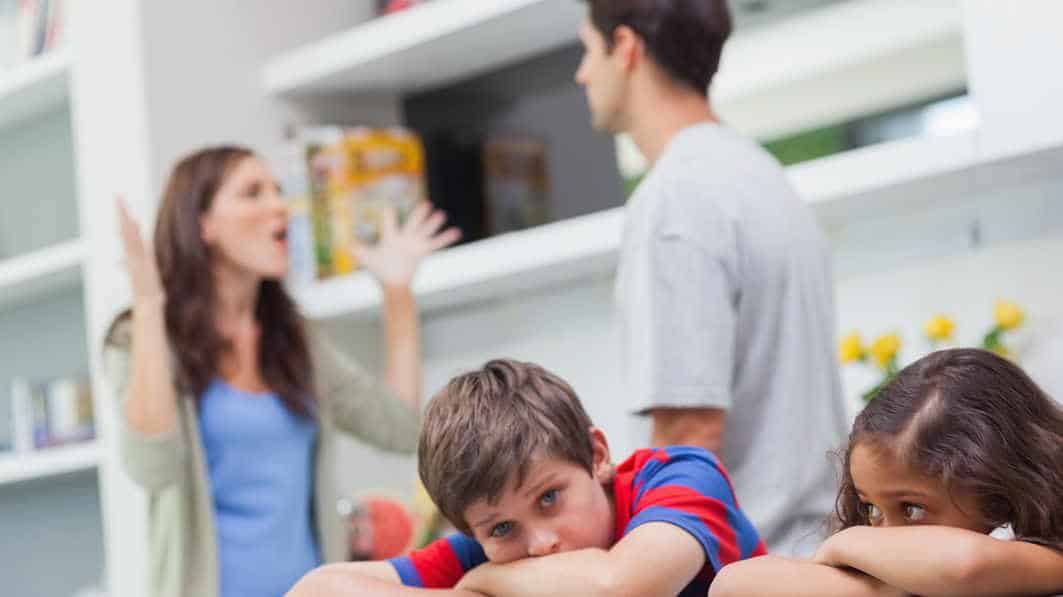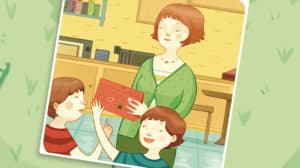In This Series:
Many years ago, the myth began to circulate that if parents are unhappy, the kids are unhappy, too. So divorce could help both parent and child. “What’s good for mom or dad is good for the children,” it was assumed. But we now have an enormous amount of research on divorce and children, all pointing to the same stubborn truth: Kids suffer when moms and dads split up. (And divorce doesn’t make mom and dad happier, either.)
The reasons behind the troubling statistics and the always-present emotional trauma are simple but profound. As licensed counselor and therapist Steven Earll writes:
Children (and adult children) have the attitude that their parents should be able to work through and solve any issue. Parents, who have given the children life, are perceived by the children as very competent people with supernatural abilities to meet the needs of the children. No problem should be too great for their parents to handle. For a child, divorce shatters this basic safety and belief concerning the parents’ abilities to care for them and to make decisions that truly consider their well-being.
Children have the strong belief that there is only one right family relationship, and that is Mom and Dad being together. Any other relationship configuration presents a conflict or betrayal of their basic understanding of life. In divorce, children [tend to] resent both the custodial and absent parent. (Interview with Steven Earll, M.A., M.S., L.P.C., C.A.C. III, August 2001.)
Research on the Effects of Divorce on Children
While virtually every child suffers the lost relationship and lost security described above, for many, the emotional scars have additional, more visible consequences. More than 30 years of research continues to reveal the negative effects of divorce on children. Most of these measurable effects are calculated in increased risks. In other words, while divorce does not mean these effects will definitely occur in your child, it does greatly increase the risks. The odds are simply against your kids if you divorce.
Research comparing children of divorced parents to children with married parents shows:
Children from divorced homes suffer academically. They experience high levels of behavioral problems. Their grades suffer, and they are less likely to graduate from high school. (Nan Marie Astone and Sara S. McLanahan, “Family Structure, Parental Practices and High School Completion,”)
- Kids whose parents divorce are substantially more likely to be incarcerated for committing a crime as a juvenile. (Cynthia Harper and Sara McLanahan, “Father Absence and Youth Incarceration,” Center for Research on Child Wellbeing, Working Paper #99-03.)
- Because the custodial parent’s income drops substantially after a divorce, children in divorced homes are almost five times more likely to live in poverty than are children with married parents. (Sara McLanahan and Gary Sandefur, Growing Up with a Single Parent: What Hurts, What Helps (Cambridge: Harvard University Press, 1994)
- Teens from divorced homes are much more likely to engage in drug and alcohol use, as well as sexual intercourse, than are those from intact families. (Robert L. Flewelling and Karl E. Bauman, “Family Structure as a Predictor of Initial Substance Use and Sexual Intercourse in Early Adolescence,”)
How Does Divorce Affect Children?
Before you say, “Not my kid,” remember that the children and teens represented in these statistics are normal kids, probably not much different from yours. Their parents didn’t think they would get involved in these things either. Again, we’re looking at increased risks.
A few more statistics to consider:
- Children from divorced homes experience illness more frequently and recover from sickness more slowly. (Jane Mauldon, “The Effects of Marital Disruption on Children’s Health,” and Olle Lundberg, “The Impact of Childhood Living Conditions on Illness and Mortality in Adulthood,”
- They are also more likely to suffer child abuse. (Catherine Malkin and Michael Lamb, “Child Maltreatment: A Test of Sociobiological Theory,” Leslie Margolin, “Child Abuse and Mother’s Boyfriends: Why the Overrepresentation?”
- Children of divorced parents suffer more frequently from symptoms of psychological distress. (P. Lindsay Chase-Lansdale, Andrew J. Cherlin and Kathleen E. Kiernan, “The Long-Term Effects of Parental Divorce on the Mental Health of Young Adults: A Developmental Perspective,“)
- And the emotional scars of divorce last into adulthood. (Wallerstein, et al., 2000, pp. xxvii-xxix; Catherine E. Ross and John Mirowsky. “Parental Divorce, Life-Course Disruption, and Adult Depression.”)
The scope of this last finding — children suffer emotionally from their parents’ divorce — has been largely underestimated. Obviously, not every child of divorce commits crime or drops out of school. Some do well in school and even become high achievers. However, we now know that even these children experience deep and lasting emotional trauma.
For all children, their parents’ divorce colors their view of the world and relationships for the rest of their lives.
Wallerstein Study
Psychologist Judith Wallerstein followed a group of children of divorce from the 1970s into the 1990s. Interviewing them at 18 months and then 5, 10, 15 and 25 years after the divorce, she expected to find that they had bounced back. But what she found was dismaying: Even 25 years after the divorce, these children continued to experience substantial expectations of failure, fear of loss, fear of change and fear of conflict. (Ibid., p. xxvii.) Twenty-five years!
The children in Wallerstein’s study were especially challenged when they began to form their own romantic relationships. As Wallerstein explains, “Contrary to what we have long thought, the major impact of divorce does not occur during childhood or adolescence. Rather, it rises in adulthood as serious romantic relationships move center stage. … Anxiety leads many [adult children of divorce] into making bad choices in relationships, giving up hastily when problems arise, or avoiding relationships altogether.” (Ibid., p. xxix.)
Effects of Divorce on Children’s Future
Other researchers confirm Wallerstein’s findings. Specifically, compared to kids from intact homes, children who experienced their parents’ divorce view premarital sex and cohabitation more favorably. (William G. Axinn and Arland Thornton, “The Influence of Parents’ Marital Dissolutions on Children’s Attitudes toward Family Formation,” Demography 33 (1996): 66-81.)
This is disturbing news given that cohabiting couples have more breakups, greater risk of domestic violence and are more likely to experience divorce (See Stanton, 1997, pp. 55-70; see also David Popenoe and Barbara Dafoe Whitehead, “Should We Live Together?” A Report of the National Marriage Project, 1999.).
Behind each of these statistics is a life — a child, now an adult, still coping with the emotions brought on by the divorce.
Parents tend to want to have their own needs met after a divorce — to find happiness again with someone new. But not only do the old problems often resurface for the adults, new problems are added for the children. As Wallerstein observed, “It’s not that parents love their children less or worry less about them. It’s that they are fully engaged in rebuilding their own lives — economically, socially and sexually. Parents’ and children’s needs are often out of sync for many years after the breakup.” (Wallerstein, et al., 2000, p. xxix.) Children again feel abandoned as parents pursue better relationships after the breakup.
How Divorce Impacts Children’s Emotions
Feelings of abandonment and confusion are only compounded when one or both parents find a new spouse. A second marriage brings complications and new emotions for children — not to mention new stepsiblings, stepparents and stepgrandparents, who often are in competition for the parent’s attention. (And the adjustment can be even more difficult — because it is the adults who choose new families, not the children.)
Lilly expressed it this way: “My loss was magnified as my father remarried and adopted a new ‘family.’ Despite attempts on my part to keep in touch, we live in different cities, and his life now revolves around his new family with infrequent contact with me. This has only increased the feelings of abandonment and alienation from the divorce.”
And the high rate of second-marriage divorces can leave children reeling from yet another loss.
Full “recovery” is nearly impossible for children because of the dynamic nature of family life. While you and your ex-spouse’s lives may go on separately with relatively little thought, your children will think about their loss almost every day. And 25 years after the fact, they will certainly be influenced by it. Life itself will remind them of the loss at even the happiest moments. As Earll explains: “Children never get over divorce. It is a great loss that is in their lives forever. It is like a grief that is never over. All special events, such as holidays, plays, sports, graduations, marriages, births of children, etc., bring up the loss created by divorce as well as the family relationship conflicts that result from the ‘extended family’ celebrating any event.” (Earll interview, August 2001.)
Not an Easy Out
What parents see as a quick way out often results in emotional damage that the children will carry for 30 years or more. Divorce is no small thing to children. It is the violent ripping apart of their parents, a loss of stability and often a complete shock. While we often think of children as resilient, going through such trauma is a lot to ask of our kids.
In light of the fact that most marriages heading for divorce can be salvaged and turned into great marriages, parents should take a long pause before choosing divorce. While it may seem like a solution to you, it’s not an easy out for you or your kids.



















